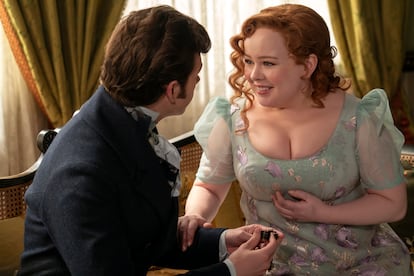‘Bridgerton’ and the world of perfect breasts
The best thing about this series is its ironic take on the romantic ideal before planting a bomb under it

At a screening for season three of Bridgerton in Dublin, an audience member tried to praise actress Nicola Coughlan for appearing half-naked as Penelope Featherington. “You’re very brave,” he told her. Anyone who hasn’t seen the series might think that the actress had to swim among sharks. In fact, the only serious danger Penelope Featherington faces is criticism for not being thin. “You know it is hard,” Coughlan responded to the veiled fat-phobic insult. “Because I think women with my body type, women with perfect breasts, we do not see ourselves on screen enough.”
The scene comes in the highly anticipated and just released episode five of the third season. Before going to bed with her beloved Colin Bridgerton played by Luke Newton, Nicola Coughlan is undressed and bares her breasts – her own idea, she has said, defining it as “the biggest fuck you to all the conversation surrounding my body.”
Based on the novels by Julia Quinn, the series has become a mass phenomenon and the most watched on Netflix in any language. Apparently, it is viewed as a soap opera that vindicates the macho and classist romantic ideal. For example, in the perfect breasts scene, young Penelope asks young Colin for sexual instructions. “Tell me what to do,” she says. She knows nothing about sex, he knows everything. It seems like the same old story, but there are subtle changes. For example, before touching her, he asks her permission and only when she consents does he begin to stimulate her, with penetrative sex kept on the back burner. “Why did you stop?” she asks. “Are you ready?” he wants to know. “Is there more?” the virginal Penelope says in response. “This may hurt,” Colin tells her. “I cannot help it, I promise. But it should only be this first time.”
The scene appears at first to be typical of its kind when, in fact, it has never been played like this before. Those of us who grew up reading the adventures of Julian Sorel in Stendhal’s The Red and the Black and Cathy and Heathcliff in Emily Brontë's Wuthering Heights learned that the romantic ideal, like education, is capable of overcoming social differences. What we were never promised is that love might overcome the social stigma attached to curves, particularly female ones.
I started watching Bridgerton in a bid to work out the appeal of a macho soap opera to modern young women around the world. And I discovered that it is not only its luxurious aesthetics, Billie Eilish’s violins or racial diversity that have us hooked. The best part is the irony it deploys when presenting the romantic ideal before planting a bomb under it. In the third season, the bomb comes in the shape of Nicola Coughlan. When Penelope reaches orgasm while making out with Colin in a carriage, and violins play Pitbull’s Give Me Everything, the audience are encouraged to realize that normative bodies are no longer the most exciting. We thought we had to change the narrative when in fact we first had to change the bodies relating it.
Sign up for our weekly newsletter to get more English-language news coverage from EL PAÍS USA Edition
Tu suscripción se está usando en otro dispositivo
¿Quieres añadir otro usuario a tu suscripción?
Si continúas leyendo en este dispositivo, no se podrá leer en el otro.
FlechaTu suscripción se está usando en otro dispositivo y solo puedes acceder a EL PAÍS desde un dispositivo a la vez.
Si quieres compartir tu cuenta, cambia tu suscripción a la modalidad Premium, así podrás añadir otro usuario. Cada uno accederá con su propia cuenta de email, lo que os permitirá personalizar vuestra experiencia en EL PAÍS.
¿Tienes una suscripción de empresa? Accede aquí para contratar más cuentas.
En el caso de no saber quién está usando tu cuenta, te recomendamos cambiar tu contraseña aquí.
Si decides continuar compartiendo tu cuenta, este mensaje se mostrará en tu dispositivo y en el de la otra persona que está usando tu cuenta de forma indefinida, afectando a tu experiencia de lectura. Puedes consultar aquí los términos y condiciones de la suscripción digital.









































